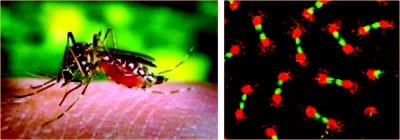Bacteria to eradicate dengue!

L-R: Aedes Aegypti infected with Wolbachia bacteria becomes dengue virus resistant. Wolbachia bacteria inside one of its hosts
We, generally, get a picture of pathogens and disease causing microorganisms in mind when we think of bacteria. However, many of them are also beneficial to humans. In fact, our body harbours a large number of bacteria on our skin and inside our gut. We call them commensals. They are useful bacteria that probably became associated with us in course of evolution. But those bacteria, which are not commensals, may also benefit humans by preventing diseases carried by insect. Recently, scientists have shown a way to prevent and, possibly, to eradicate dengue fever with the aid of a bacterium Wolbachia. In two papers published recently in Nature, Australian researchers showed how female mosquitoes infected with the Wolbachia bacteria transmitted the bug to their offspring with ease, making them all dengue free and hence unable to spread the virus in humans. The scientists claimed they have discovered a cheap and effective method of preventing the transmission of dengue fever. Until now, pesticides are being used to kill mosquitoes carrying particular types of viruses inside them but those contribute to only increasing the resistance of the mosquitoes to these chemicals. However, the newly discovered method gave rise to dengue- virus-resistant mosquitoes and they can be released in the wild to spread their population making the mosquito population of a particular region homogenous for the dengue resistant ones.
Indeed, scientists have rapidly replaced mosquitoes in the wild with skeeters that don't spread the dengue virus. The trick from the scientists was infecting the Aedes Aegypti mosquitoes (the mosquito species that can harbour the dengue virus) with a particular kind of bacteria named Wolbachia. After that, they tested whether the virus resistant ones (infected with the Wolbachia bacteria) could displace their ordinary cousins in the wild, thus reducing and, in the future, may be removing the dengue spreading mosquitoes. The mechanism of spreading the resistant mosquitoes is quite interesting. The resistant varieties get an advantage in reproduction over the wild ones. When resistant females mate with either resistant or ordinary mosquitoes, all the offspring will be resistant. However, mating of ordinary females with a resistant male gives rise to nonviable eggs and hence none of the offspring survive.
" And this bacteria, we have found that when it is in the mosquito, prevents the mosquito from being able to grow the dengue virus in its body" said Scott O'Neill, Professor of Biology at Monash University, Melbourne and lead author of this study. "And if it can't grow it, then it can't transmit it between people". There are two possible mechanisms according to him that the bacteria uses to stop the transmission of the virus. One is boosting the immune system of the mosquito so that it can easily recognize and get rid of the virus. Another possibility is, the bacteria compete with the virus for the cellular component, one type of fatty acid, to use as food which the virus would use for its replication otherwise and thus becomes unable to multiply inside the host mosquito. Again, there is a second thought that both of the mechanisms work together to exert the ultimate effect on the virus.
John Rasgon of the John Hopkins Bloomberg School of Public Health in Baltimore indicated that the result of the study was a "groundbreaking first step". The next challenge will be to test the idea where dengue spreads constantly rather than sporadically as in the tested regions of Australia targeted for the present study. Going one step further, if researchers become able to show that the strategy works against varied strains of dengue virus, then there will be a hope to completely eradicate dengue fever only with the use of a particular type of bacteria!

 For all latest news, follow The Daily Star's Google News channel.
For all latest news, follow The Daily Star's Google News channel. 



Comments